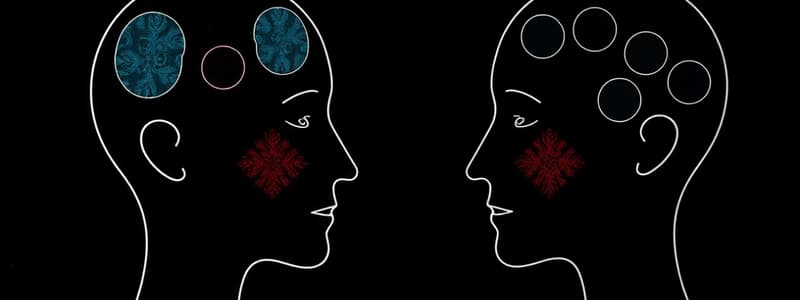Podcast
Questions and Answers
What term refers to the principle that governs the ego in balancing demands of the id and reality?
What term refers to the principle that governs the ego in balancing demands of the id and reality?
- Reality principle (correct)
- Pleasure principle
- Desire principle
- Conscious principle
Which of the following is NOT a defense mechanism in psychoanalysis?
Which of the following is NOT a defense mechanism in psychoanalysis?
- Projection control (correct)
- Reaction formation
- Rationalization
- Displacement
Which model describes personality traits and includes five primary dimensions?
Which model describes personality traits and includes five primary dimensions?
- Behavioral Model
- Ego Model
- Cognitive Dissonance Model
- Five-factor model (correct)
The fundamental attribution error occurs when individuals tend to attribute others' behaviors to which type of factors?
The fundamental attribution error occurs when individuals tend to attribute others' behaviors to which type of factors?
In the context of coping strategies, what does emotion-focused coping primarily involve?
In the context of coping strategies, what does emotion-focused coping primarily involve?
Which disorder is characterized by persistent feelings of sadness and loss of interest?
Which disorder is characterized by persistent feelings of sadness and loss of interest?
What aspect does the Social Readjustment Rating Scale (SRRS) measure?
What aspect does the Social Readjustment Rating Scale (SRRS) measure?
Which therapy approach is commonly associated with the ABC model?
Which therapy approach is commonly associated with the ABC model?
Flashcards
Ego
Ego
The part of the personality that mediates between the id's impulses and the superego's demands, operating on the reality principle.
Defense Mechanisms
Defense Mechanisms
Unconscious strategies used by the ego to protect itself from anxiety and maintain a positive self-image.
Displacement
Displacement
Redirecting unacceptable impulses toward a less threatening target.
Reaction Formation
Reaction Formation
Signup and view all the flashcards
Conditional vs. Unconditional Positive Regard
Conditional vs. Unconditional Positive Regard
Signup and view all the flashcards
Self-Efficacy
Self-Efficacy
Signup and view all the flashcards
Five-Factor Model
Five-Factor Model
Signup and view all the flashcards
Implicit Cognition
Implicit Cognition
Signup and view all the flashcards
Study Notes
Chapter 11, Part 1
- Ego, reality principle
- Defense mechanisms: displacement, reaction formation
- Limitations of the psychoanalytic perspective
- Conditional vs. unconditional positive regard
- Self-efficacy
- Five-factor model
- Comparison and contrast of theories
Chapter 11, Part 2
- Person-situation debate
- Five-factor model: changes across the lifespan
Chapter 11, Part 3
- Projective tests
Chapter 12, Part 1
- Implicit cognition vs. explicit cognition
- Social cognition
- Social influence
- Social categorization
- Implicit personality theory
- Attribution
- Fundamental attribution error
- Cognitive dissonance
Chapter 12, Part 2
- Stereotypes
- Out-group homogeneity effect
- Robbers Cave study
Chapter 12, Part 3
- Conformity
- Normative social influence
- Stanley Milgram's critical question
Chapter 12, Part 4
- Factors increasing helping behavior
- Social loafing
- Social striving
Chapter 13, Part 1
- Stress
- Cognitive appraisal model of stress
- How stress indirectly affects health
- Fight-or-flight response
- Corticosteroids and the immune system
Chapter 13, Part 2
- Holmes and Rahe
- Social Readjustment Rating Scale (SRRS)
Chapter 13, Part 3
- Optimistic vs. pessimistic explanatory style
- Type A behavior pattern
- Hostility
- Problem-focused coping
- Emotion-focused coping
- Escape-avoidance coping
- Positive reappraisal
Chapter 14, Part 1
- DSM-5
Chapter 14, Part 2
- Anxiety
- Pathological anxiety
- Generalized Anxiety Disorder (GAD)
- Explaining phobias
- Obsession vs. compulsion
Chapter 14, Part 3
- Major depressive disorder
Chapter 14, Part 4
- Manic episode
- Anorexia nervosa
- Bulimia nervosa
- Borderline personality disorder
Chapter 14, Part 5
- Positive symptoms
- Negative symptoms
- Hallucinations
- Delusions
Chapter 15, Part 1
- Goals of psychoanalysis
- Resistance
- Client-centered therapy: assumptions and goals
- Cognitive therapy assumptions
- ABC model
- Rational-Emotive Behavior Therapy
Chapter 15, Part 2
- Research on the effectiveness of psychotherapy
Studying That Suits You
Use AI to generate personalized quizzes and flashcards to suit your learning preferences.





